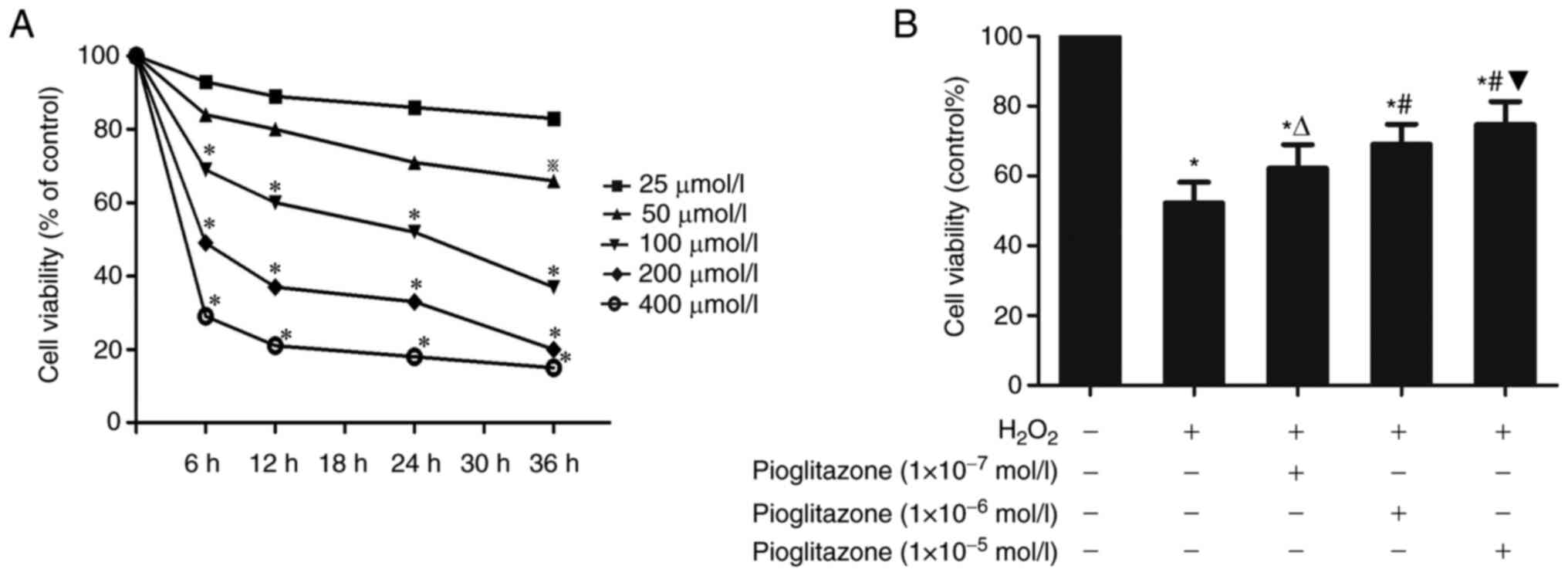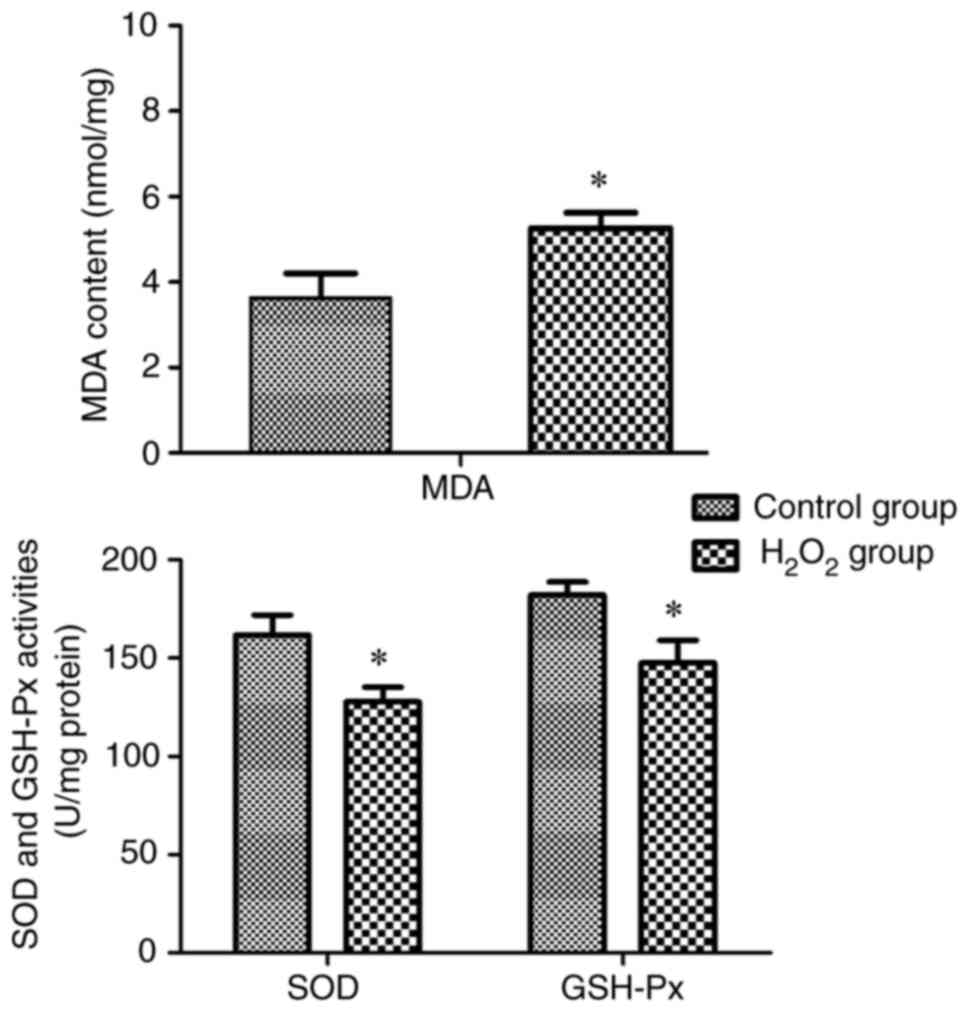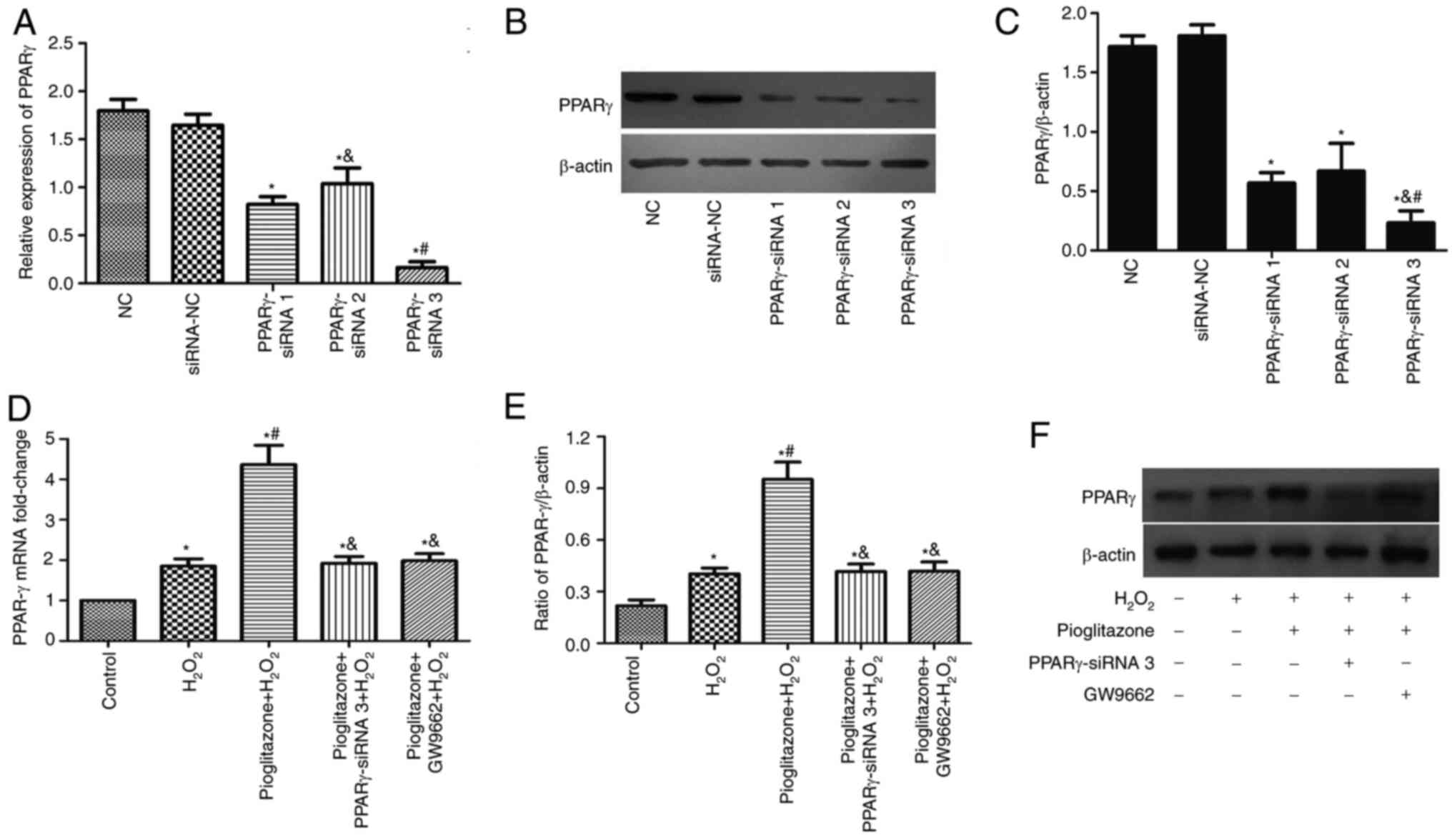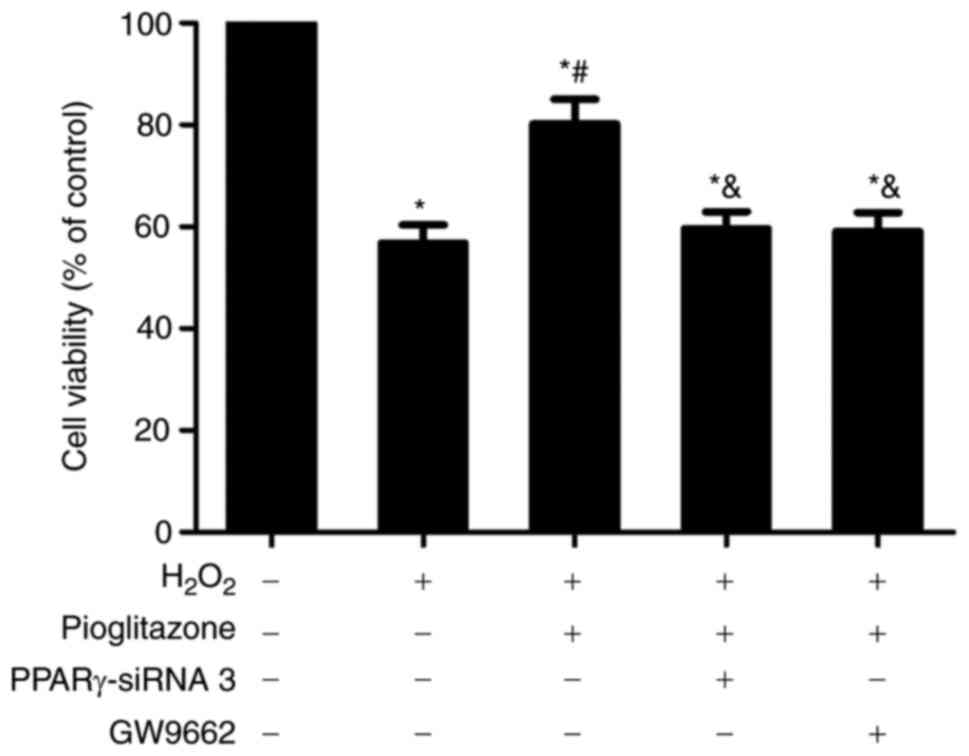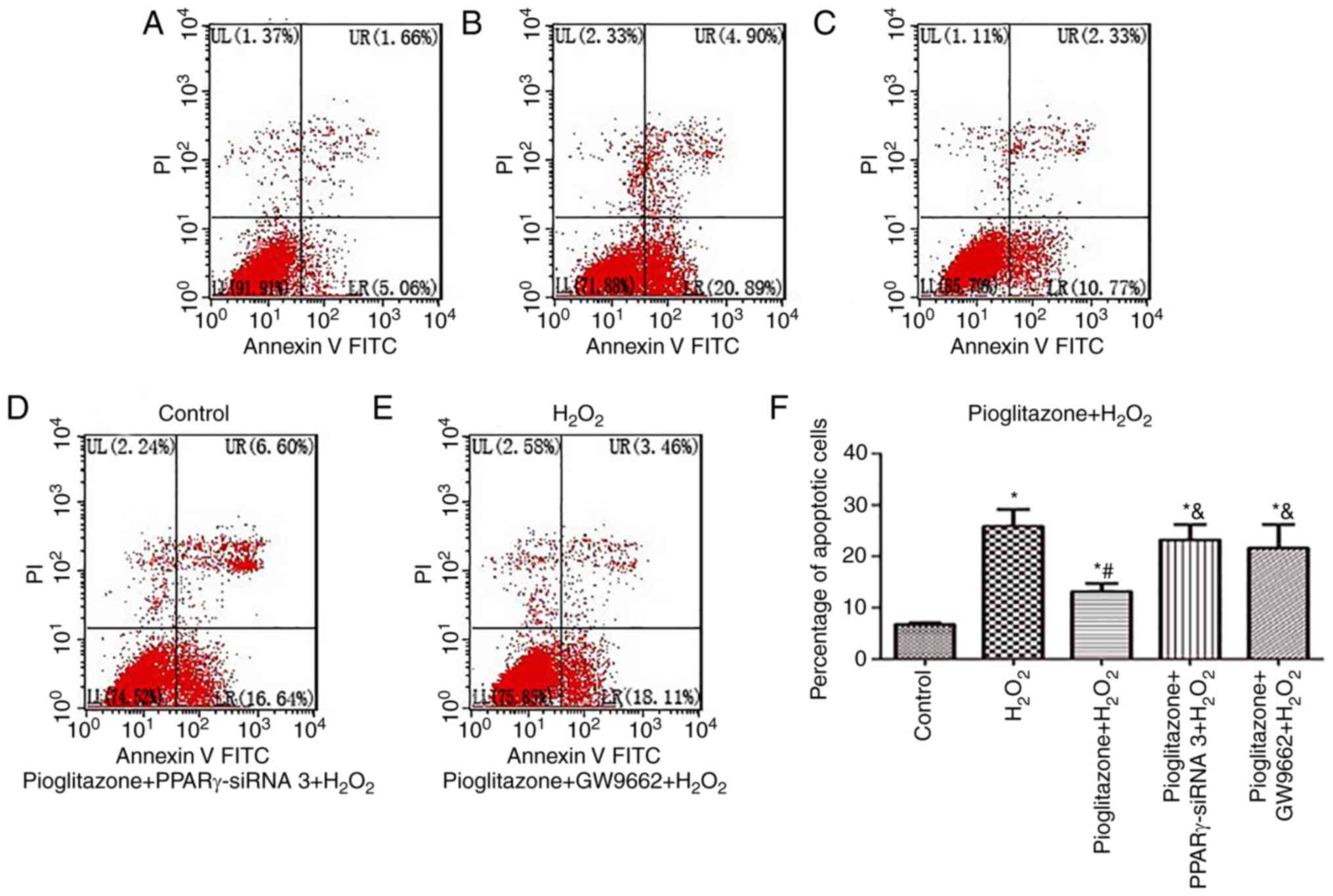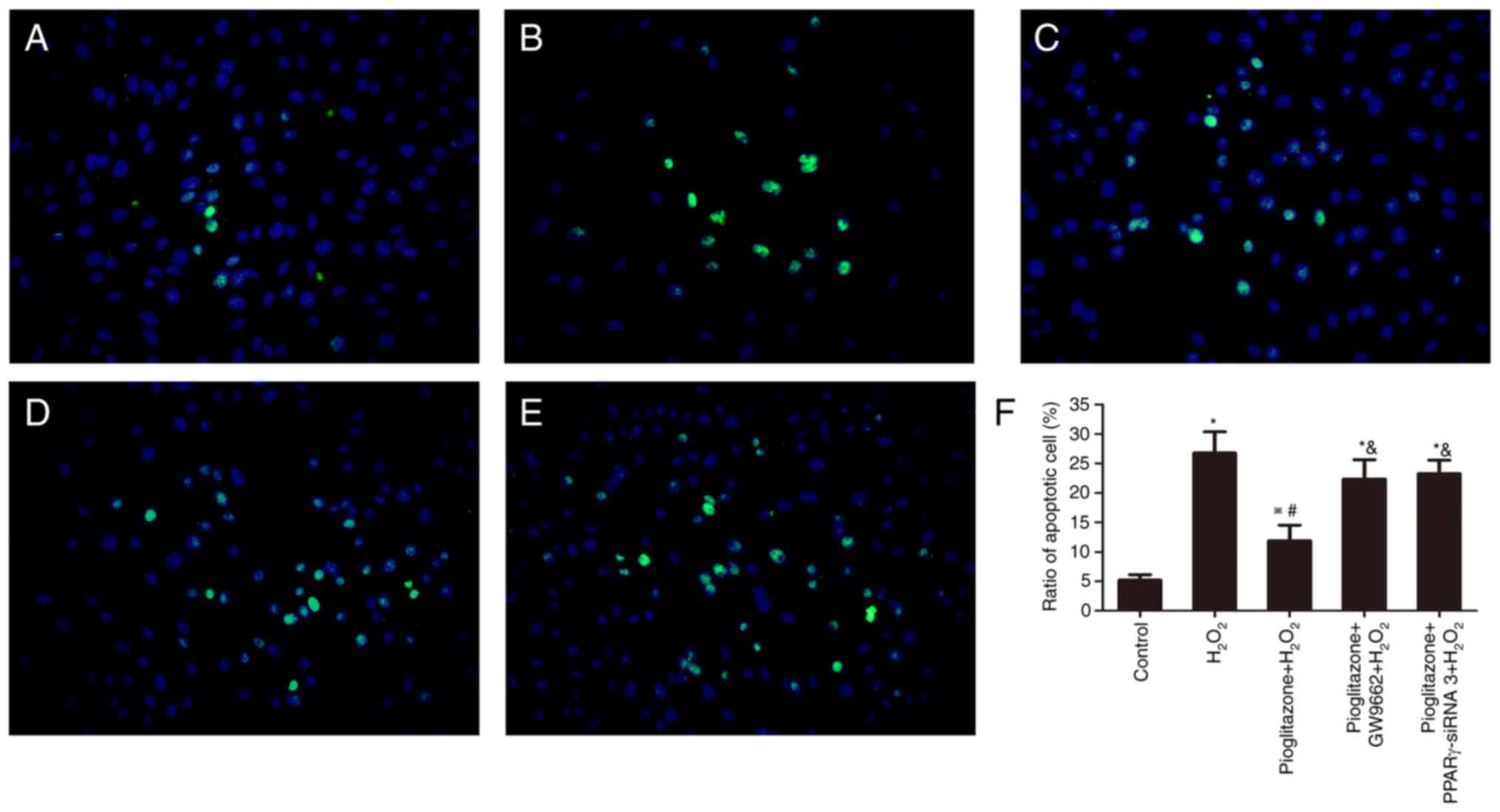|
1
|
Gitler AD, Dhillon P and Shorter J:
Neurodegenerative disease: Models, mechanisms, and a new hope. Dis
Model Mech. 10:499–502. 2017.PubMed/NCBI View Article : Google Scholar
|
|
2
|
Huang H, Chen L, Mao G, Bach J, Xue Q, Han
F, Guo X, Otom A, Chernykh E, Alvarez E, et al: The 2019 yearbook
of neurorestoratology. J Neurorestoratology. 8:1–11.
2020.PubMed/NCBI View Article : Google Scholar
|
|
3
|
Tang XQ, Feng JQ, Chen J, Chen PX, Zhi JL,
Cui Y, Guo RX and Yu HM: Protection of oxidative preconditioning
against apoptosis induced by H2O2 in PC12
cells: Mechanisms via MMP, ROS, and Bcl-2. Brain Res. 1057:57–64.
2005.PubMed/NCBI View Article : Google Scholar
|
|
4
|
Shao A, Lin D, Wang L, Tu S, lenahan C and
Zhang J: Oxidative stress at the crossroads of aging, stroke and
depression. Aging Dis. 11:1537–1566. 2020.PubMed/NCBI View Article : Google Scholar
|
|
5
|
Wiatrak B, Kubis-Kubiak A, Piwowar A and
Barg E: PC12 cell line: Cell types, coating of culture vessels,
differentiation and other culture conditions. Cells.
9(958)2020.PubMed/NCBI View Article : Google Scholar
|
|
6
|
D'Arcy MS: Cell death: A review of the
major forms of apoptosis, necrosis and autophagy. Cell Biol Int.
43:582–592. 2019.PubMed/NCBI View Article : Google Scholar
|
|
7
|
Jensen K, WuWong DJ, Wong S, Matsuyama M
and Matsuyama S: Pharmacological inhibition of Bax-induced cell
death: Bax-inhibiting peptides and small compounds inhibiting Bax.
Exp Biol Med(Maywood). 244:621–629. 2019.PubMed/NCBI View Article : Google Scholar
|
|
8
|
Zhou Z, Meng M and Ni H: Chemosensitizing
effect of astragalus polysaccharides on nasopharyngeal carcinoma
cells by inducing apoptosis and modulating expression of Bax/Bcl-2
ratio and caspases. Med Sci Monit. 23:462–469. 2017.PubMed/NCBI View Article : Google Scholar
|
|
9
|
Jiang H, Zhao PJ, Su D, Feng J and Ma SL:
Paris saponin I induces apoptosis via increasing the Bax/Bcl-2
ratio and caspase-3 expression in gefitinib-resistant non-small
cell lung cancer in vitro and in vivo. Mol Med Rep.
9:2265–2272. 2014.PubMed/NCBI View Article : Google Scholar
|
|
10
|
Jang JH and Surh YJ: Protective effects of
resveratrol on hydrogen peroxide-induced apoptosis in rat
pheochromocytoma (PC12) cells. Mutat Res. 496:181–190.
2001.PubMed/NCBI View Article : Google Scholar
|
|
11
|
Del Rio MJ and Velez-Pardo C: Monoamine
neurotoxins-induced apoptosis in lymphocytes by a common oxidative
stress mechanism: Involvement of hydrogen peroxide
(H(2)O(2)), caspase-3, and nuclear factor
kappa-B (NF-kappaB), p53, c-Jun transcription factors. Biochem
Pharmacol. 63:677–688. 2002.PubMed/NCBI View Article : Google Scholar
|
|
12
|
Stump M, Mukohda M, Hu C and Sigmund CD:
PPARγ regulation in hypertension and metabolic syndrome. Curr
Hypertens Rep. 17(89)2015.PubMed/NCBI View Article : Google Scholar
|
|
13
|
Wang SB, Dougherty EJ and Danner RL: PPARγ
signaling and emerging opportunities for improved therapeutics.
Pharmacol Res. 111:76–85. 2016.PubMed/NCBI View Article : Google Scholar
|
|
14
|
Li Y, Yu G, Liu L, Long J, Su S, Zhao T,
Liu W, Shen S and Niu X: Rosiglitazone attenuates cell apoptosis
through antioxidative and anti-apoptotic pathways in the hippocampi
of spontaneously hypertensive rats. Int J Mol Med. 43:693–700.
2019.PubMed/NCBI View Article : Google Scholar
|
|
15
|
Kumar P, Nagarajan A and Uchil PD:
Analysis of cell viability by the MTT assay. Cold Spring Harb
Protoc 2018, 2018.
|
|
16
|
Xiao Z, Yu X, Zhang S and Liang A: The
expression levels and significance of GSH, MDA, SOD, and 8-OHdG in
osteochondral defects of rabbit knee joints. Biomed Res Int.
2022(6916179)2022.PubMed/NCBI View Article : Google Scholar
|
|
17
|
Livak KJ and Schmittgen TD: Analysis of
relative gene expression data using real-time quantitative PCR and
the 2(-Delta Delta C(T)) method. Methods. 25:402–408.
2001.PubMed/NCBI View Article : Google Scholar
|
|
18
|
Refaie MMM and El-Hussieny M: Protective
effect of pioglitazone on ovarian ischemia reperfusion injury of
female rats via modulation of peroxisome proliferator activated
receptor gamma and heme-oxygenase 1. Int Immunopharmacol. 62:7–14.
2018.PubMed/NCBI View Article : Google Scholar
|
|
19
|
Li Y, Liu J, Gao D, Wei J, Yuan H, Niu X
and Zhang Q: Age-related changes in hypertensive brain damage in
the hippocampi of spontaneously hypertensive rats. Mol Med Rep.
13:2552–2560. 2016.PubMed/NCBI View Article : Google Scholar
|
|
20
|
Lahiani A, Brand-Yavin A, Yavin E and
Lazarovici P: Neuroprotective effects of bioactive compounds and
MAPK pathway modulation in ‘ischemia’-stressed PC12
pheochromocytoma cells. Brain Sci. 8(32)2018.PubMed/NCBI View Article : Google Scholar
|
|
21
|
Satoh T, Sakai N, Enokido Y, Uchiyama Y
and Hatanaka H: Free radical-independent protection by nerve growth
factor and Bcl-2 of PC12 cells from hydrogen peroxide-triggered
apoptosis. J Biochem. 120:540–546. 1996.PubMed/NCBI View Article : Google Scholar
|
|
22
|
Guo Z, Huang M, Yuan Y, Guo Y, Song C,
Wang H and Dang X: Nischarin downregulation attenuates cell injury
induced by oxidative stress via Wnt signaling. Neuroreport.
31:1199–1207. 2020.PubMed/NCBI View Article : Google Scholar
|
|
23
|
Nakayama H, Nakahara M, Matsugi E, Soda M,
Hattori T, Hara K, Usami A, Kusumoto C, Higashiyama S and Kitaichi
K: Protective effect of ferulic acid against hydrogen peroxide
induced apoptosis in PC12 cells. Molecules. 26(90)2020.PubMed/NCBI View Article : Google Scholar
|
|
24
|
Xiao L, Liao F, Ide R, Horie T, Fan Y,
Saiki C and Miwa N: Enzyme-digested Colla Corii Asini (E'jiao)
prevents hydrogen peroxide-induced cell death and accelerates
amyloid beta clearance in neuronal-like PC12 cells. Neural Regen
Res. 15:2270–2272. 2020.PubMed/NCBI View Article : Google Scholar
|
|
25
|
Islam MT: Oxidative stress and
mitochondrial dysfunction-linked neurodegenerative disorders.
Neurol Res. 39:73–82. 2017.PubMed/NCBI View Article : Google Scholar
|
|
26
|
de Oliveira Ulbrecht MO, Gonçalves DA,
Zanoni LZG and do Nascimento VA: Association between selenium and
malondialdehyde as an efficient biomarker of oxidative stress in
infantile cardiac surgery. Biol Trace Elem Res. 187:74–79.
2019.PubMed/NCBI View Article : Google Scholar
|
|
27
|
Wang XF, Huang YF, Wang L, Xu LQ, Yu XT,
Liu YH, Li CL, Zhan JY, Su ZR, Chen JN and Zeng HF:
Photo-protective activity of pogostone against UV-induced skin
premature aging in mice. Exp Gerontol. 77:76–86. 2016.PubMed/NCBI View Article : Google Scholar
|
|
28
|
Dumont A, Hehner SP, Hofmann TG, Ueffing
M, Dröge W and Schmitz ML: Hydrogen peroxide-induced apoptosis is
CD95-independent, requires the release of mitochondria-derived
reactive oxygen species and the activation of NF-kappaB. Oncogene.
18:747–757. 1999.PubMed/NCBI View Article : Google Scholar
|
|
29
|
Matsura T, Kai M, Fujii Y, Ito H and
Yamada K: Hydrogen peroxide-induced apoptosis in HL-60 cells
requires caspase-3 activation. Free Radic Res. 30:73–83.
1999.PubMed/NCBI View Article : Google Scholar
|
|
30
|
Kitamura Y, Ota T, Matsuoka Y, Tooyama I,
Kimura H, Shimohama S, Nomura Y, Gebicke-Haerter PJ and Taniguchi
T: Hydrogen peroxide-induced apoptosis mediated by p53 protein in
glial cells. Glia. 25:154–164. 1999.PubMed/NCBI
|
|
31
|
Jiang MC, Liang HJ, Liao CF and Lu FJ:
Methyl methanesulfonate and hydrogen peroxide differentially
regulate p53 accumulation in hepatoblastoma cells. Toxicol Lett.
106:201–208. 1999.PubMed/NCBI View Article : Google Scholar
|
|
32
|
Li RL, Zhang Q, Liu J, Sun JY, He LY, Duan
HX, Peng W and Wu CJ: Hydroxy-α-sanshool possesses protective
potentials on H2O2-stimulated PC12 cells by
suppression of oxidative stress-induced apoptosis through
regulation of PI3K/Akt signal pathway. Oxid Med Cell Longev.
2020(3481758)2020.PubMed/NCBI View Article : Google Scholar
|
|
33
|
Senichkin VV, Pervushin NV, Zuev AP,
Zhivotovsky B and Kopeina GS: Targeting Bcl-2 family proteins:
What, where, when? Biochemistry (Mosc). 85:1210–1226.
2020.PubMed/NCBI View Article : Google Scholar
|
|
34
|
Oltvai ZN, Milliman CL and Korsmeyer SJ:
Bcl-2 heterodimerizes in vivo with a conserved homolog, Bax, that
accelerates programmed cell death. Cell. 74:609–619.
1993.PubMed/NCBI View Article : Google Scholar
|
|
35
|
Ding YP, Kang J, Liu S, Xu Y and Shao B:
The protective effects of peroxisome proliferator-activated
receptor gamma in cerebral ischemia-reperfusion injury. Front
Neurol. 11(588516)2020.PubMed/NCBI View Article : Google Scholar
|
|
36
|
Fuenzalida K, Quintanilla R, Ramos P,
Piderit D, Fuentealba RA, Martinez G, Inestrosa NC and Bronfman M:
Peroxisome proliferator-activated receptor gamma up-regulates the
Bcl-2 anti-apoptotic protein in neurons and induces mitochondrial
stabilization and protection against oxidative stress and
apoptosis. J Biol Chem. 282:37006–37015. 2007.PubMed/NCBI View Article : Google Scholar
|
|
37
|
Cimini A, Benedetti E, Cristiano L,
Sebastiani P, D'Amico MA, D'Angelo B and Di Loreto S: Expression of
peroxisome proliferator-activated receptors (PPARs) and retinoic
acid receptors (RXRs) in rat cortical neurons. Neuroscience.
130:325–337. 2005.PubMed/NCBI View Article : Google Scholar
|
|
38
|
Wang N, Han J, Xu Y, Liang H, Cheng Y and
Sun L: Hydrogen peroxide-induced changes of PPARγ in primary
cultured cortical neurons. Zhonghua Yi Xue Za Zhi. 95:1686–1690.
2015.PubMed/NCBI(In Chinese).
|















